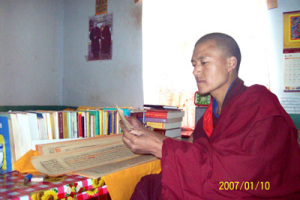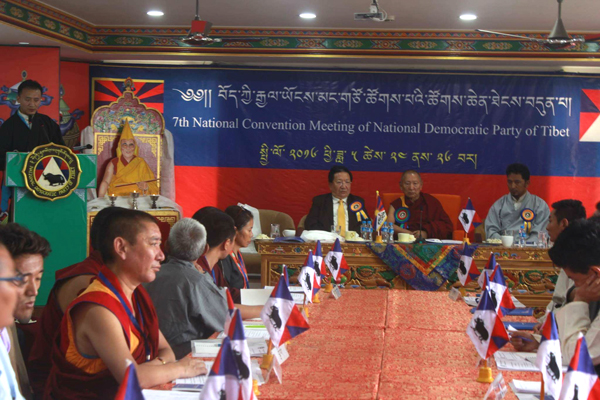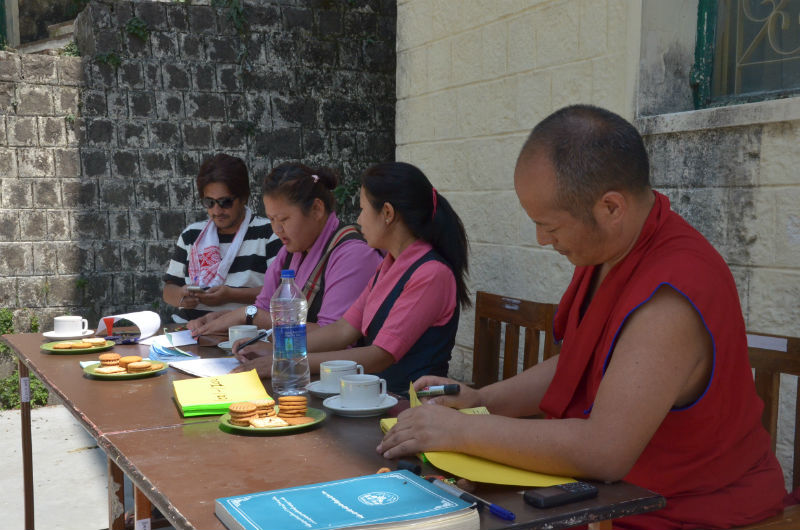Tulku Hungkar Dorjee Posthumously Awarded 2025 Tenzin Delek Rinpoche Medal of Courage After Transnational Execution
By Tenzin Chokyi
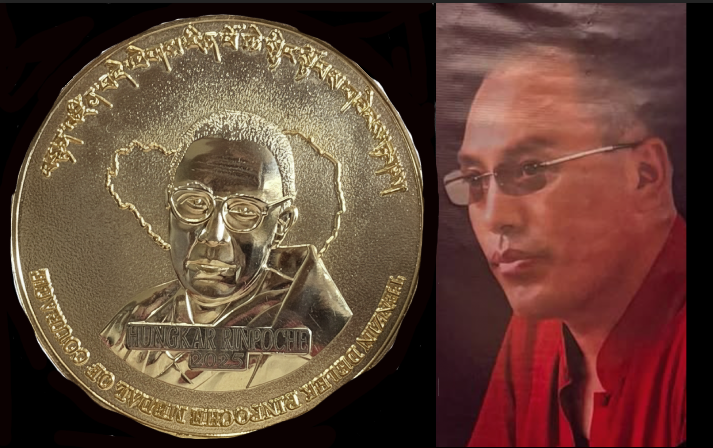
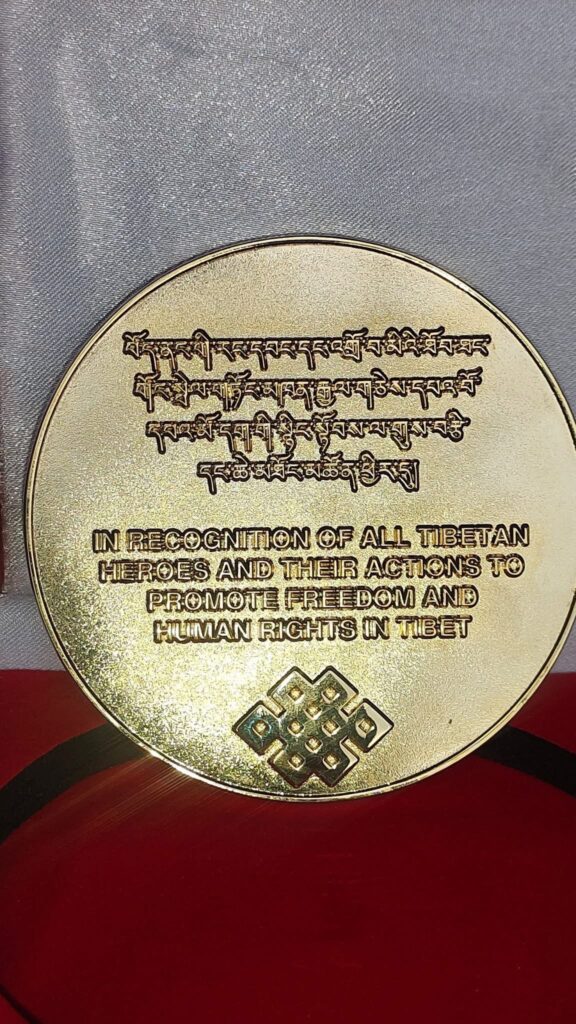
DHARAMSALA, 13 Oct: The late Tulku Hungkar Dorjee of Lung Ngon Monastery in Golog, occupied Tibet, has been posthumously awarded the 2025 Tenzin Delek Rinpoche Medal of Courage. This honour recognises his unwavering commitment to preserving and advancing the freedom and rights of the Tibetan people under Chinese occupation, which ultimately cost him his life under a covert collaboration between the Chinese and Vietnamese governments.
The award, organised by the International Tibet Network (ITN), was presented today at the Tibetan Settlement Hall in McLeod Ganj. It was jointly selected from among seven candidates by five major Tibetan political organizations: the Tibetan Youth Congress (TYC), Tibetan Women’s Association (TWA), National Democratic Party of Tibet (NDPT), Students for a Free Tibet( SFT), and ITN.
Ju Tenkhyong, Director of Amnye Machen Institute, who was the primary contact with sources in Vietnam and played a crucial role in relaying information to the exile community about the sudden death of the Tibetan lama last April, accepted the Gold Medal on behalf of the late Tulku’s family in occupied Tibet.
He stated that the condition and whereabouts of his family remain unknown following the execution of the lama in Vietnam, as Chinese authorities have severely restricted access to the region once under his influence, cutting off all communication with the outside world.
In her address as the Chief Guest, Gyari Dolma, the Security Minister of the Tibetan government in exile, unequivocally stated that Tulku Hungkar’s execution had one clear reason: he refused to comply with China’s political demands and rejected becoming a puppet lama under the Chinese government.
Both Ju Tenkyong and Kalon Gyari Dolma emphasized the unique and alarming nature of this violence, which is no longer confined within China’s borders but has become transnational in scope.
Gyari Dolma drew a parallel between the case of Tulku Delek Rinpoche, who died in Chinese custody a decade ago, and that of Tulku Hungkar in 2025, though in a different country and with more destructive approaches, noting the expanding reach of China’s colonial repression.
She further declared that “the current situation inside Tibet is more severe than being under martial law,” emphasizing that the level of surveillance, control, and repression has surpassed even the harshest conditions typically associated with military rule.
“As the Security Minister of the Tibetan government-in-exile, I must say that Tibet today is closed. It is extremely difficult for any information to get out. And even when we do receive information, we must be very cautious about how we share it publicly, to avoid putting the informant and related Tibetans inside occupied Tibet at serious risk,” she added.
The latest international action demanding clarification for the suspicious death of Tulku Hungkar, directed at both the Chinese and Vietnamese governments, has come in the form of a communication letter from a group of UN human rights experts. As with many such letters in the past, it has gone unanswered.
Tenzin Passang, the national director of SFT-India, speaking on behalf of the four Tibetan political NGOs, recognized the move as “a small but significant step,” inferring that much more work remains to be done, a sentiment that also reflects the ongoing challenges of the Tibetan exile community, where, ironically, the United Nations remains the ultimate, and often the only resort.
Dr. Lobsang Yangtso, Program and Environment Coordinator of the ITN, stated that they will carry forward the UN intervention to continue advocating and demanding clarification and justice for Tulku Hungkar’s death in countries across the globe, ensuring that the international community is made aware of China’s crimes.
The case of Tulku Hungkar tragically echoes that of Tulku Tenzin Delek, who died in Chinese custody over a decade ago. Despite persistent efforts by Tibetans in exile and international allies to draw global attention through advocacy, documentation, and engagement with UN mechanisms, the situation inside occupied Tibet has not improved. In fact, it has only worsened.
This enduring gap between being heard and being acted upon is what makes Tulku Hungkar’s death not only a personal tragedy, but a national one for the Tibetan people – a stark symbol of the limits of international justice in the face of unchecked authoritarian power.
Tulku Tenzin Delek Rinpoche was a well-respected Tibetan spiritual teacher who passed away under mysterious circumstances on 12 July 2015 after spending 13 years of his life sentence in Chinese custody as the Chinese government continued to ignore repeated calls made by Tibetans and international bodies to release Rinpoche on medical parole.
Tulku Delek established many monasteries and schools in Tibet and actively campaigned for the protection of Tibet’s fragile environment.
In 1987, on numerous occasions in Lithang in the traditional Tibetan province of Kham, Rinpoche urged Tibetans to refrain from practicing Dhol Gyal (a deity considered highly sectarian by the Dalai Lama and Tibetans) worship and directed many of his students to complete their religious lessons in India.
Tulku Delek also campaigned against deforestation and the protection of endangered species in Tibet.
Previous recipients of the “Medal of Courage” include incarcerated retired medical doctor Yeshe Choedron (2016), imprisoned Tibetan language activist Tashi Wangchuk (2017), Dhondup Wangchen, Golog Jigme (2018), environmental activist Anya Sengdra (2022), Dorjee Tashi and Gonpo Kyi ( 2023) and Derge Protesters (2024)


